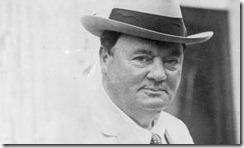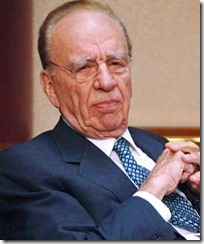


Some typical owners: mad Northcliffe, thief Maxwell, megalomaniac Murdoch
The email from M/S Conny Fuchs, implicitly propounding the worth and value of the media industry, gives us a chance to disagree. Not with the German media, we hasten to add, about which we know little save that an independent German press has rarely existed, but with the UK press. This week the London Evening Standard’s media analyst, “Professor” Roy Greenslade, gave us some statistics and analysis regarding its health.
Greenslade, like so many other UK journalists, did rather well out of Madeleine McCann, joining enthusiastically in the UK press Death Ride and raising his public profile sharply by joining the parents’ paid mouthpiece shoulder to shoulder on a debating platform. He was yet another of the worthies who presume to pontificate about the case without any real knowledge of it, finding the parents very hard done by indeed before writing a column in which he expressed his exasperation about the mysterious Tapas group and asking if somebody could please tell him whether it contained seven members or nine?
As usual the statistics tell the same story of unrelenting decline in both the numbers and the profitability of the print news media; Sunday newspaper readership, for example, has dropped from 16.2 million readers in 1991 to just 8.3 million by this August. Greenslade wonders whether the trend can be reversed. The answer’s no, Roy, for both Sundays and Dailies: the public have stopped buying your products and your industry is on the way to joining UK motorbikes, UK coal and the rest in the dustbin and along with it the careers of you and your colleagues.
The professor himself offers some pop sociological analysis of the factors that might be causing this catastrophe – the usual stuff about leisure changes and increased television watching – before turning portentously to one of the elephants in the room with these words. “And what, you may well ask, about the internet?”
Unfortunately this promising beginning is answered by “What indeed?” and then a mere two incoherent sentences about not knowing when people tune into it, whatever that may mean. Oh, dear.
Roy shouldn’t need to be told how bad the situation is – he’s sitting in the middle of it. The Evening Standard itself, only a couple of decades ago one of the most influential voices in the British press with a bright house style, good guest writers, political influence and packed advertising pages, is these days a tawdry freesheet, sold to a Russian adventurer for a pound and now given away at tube stations for free, like the beggar’s paper The Big Issue, which it increasingly resembles. Nearly all its decent journalists are gone and the classified ads section long ago migrated to the net. An undignified but well deserved end: the print news media in microcosm.
Naturally perhaps, Mr Greenslade never suggests that there might be another reason for the decline – that the product itself is rotten, as rotten as stinking fish, and that a very large proportion of the people working with the product are just as rotten themselves, corrupted by the monopoly position in information that they retained for so long. Nor does it occur to him that the internet didn’t cause the industry problems – it just happened to provide, for the very first time, a real alternative to the stinking fish monopoly: people couldn’t run fast enough once there was somewhere else to go.
It was the printers who were the first to pay with their jobs for the dishonesty and corruption which infests the press. Being thick as well as greedy the print unions set up a crazed and self-destructive monopoly within the monopoly, ensuring the papers were printed on hundred year old hot metal presses, censoring the stories they didn’t like, instituting a system of unstoppable perks and bonuses and, finally, establishing an organized income tax evasion plan in which the management silently colluded.
Those newspaper printers are now gone as completely as Manchester mill weavers. But what was their justification for their suicidal money grabbing? Their answer, and by no means an inaccurate one, was they’re all at it, why shouldn’t we join in? They saw the crooks and chancers who owned the papers, the journalists with their “expenses” which dwarfed what MPs could get away with and all the other perquisites which monopolies can enjoy at the consumers’ expense. And the censorship? Listen, said the printers, have you ever seen any of the bosses’ families or friends written about? We’re just doing the same thing. It was rather worse than that: on top of the financial corruption and theft there was the increasing corruption of the news itself as PR men, politicians and advertisers bought their way into the pages so that it was no longer possible to know what was real news anymore, what was invented and what was planted for a reason.
As reality began to catch up and sales to turn down at the turn of the century the players, perhaps sensing the end of the good times ahead, grew even more reckless and cynical. Such was the situation when Madeleine McCann went missing, bringing cries of relief from the industry at the size of the approaching bonanza.
We’ll have a look at just a small part of that Death Ride and see whether it matches the exalted claims made on behalf of the merits and ability of the “professionals” by Conny Keir and her like – the Mirror Group, Lori Campbell and the McCanns.
http://blacksmithbureau.blogspot.com/2011/09/squalid-industry-that-deserves-to-die.html
